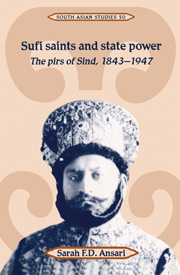Book contents
- Frontmatter
- Contents
- List of illustrations
- Acknowledgements
- A note on spelling
- List of abbreviations
- Glossary
- Introduction
- 1 Sind and its pirs up to 1843
- 2 Creating a system of political control after 1843
- 3 Challenge to the system: the Pir Pagaro and the Hur rebellion of the 1890s
- 4 Challenge to the system: the Khilafat movement, 1919–1924
- 5 A more complex system of political control: pirs and politics under the raj, 1900–1947
- 6 The final challenge: the Pir Pagaro again
- Epilogue
- Conclusion
- Select bibliography
- Index
- Cambridge South Asian Studies
5 - A more complex system of political control: pirs and politics under the raj, 1900–1947
Published online by Cambridge University Press: 01 October 2009
- Frontmatter
- Contents
- List of illustrations
- Acknowledgements
- A note on spelling
- List of abbreviations
- Glossary
- Introduction
- 1 Sind and its pirs up to 1843
- 2 Creating a system of political control after 1843
- 3 Challenge to the system: the Pir Pagaro and the Hur rebellion of the 1890s
- 4 Challenge to the system: the Khilafat movement, 1919–1924
- 5 A more complex system of political control: pirs and politics under the raj, 1900–1947
- 6 The final challenge: the Pir Pagaro again
- Epilogue
- Conclusion
- Select bibliography
- Index
- Cambridge South Asian Studies
Summary
I and [my] followers are pleased with the services of Rais Ali Muhammad Mari, Assembly Member of Shahdadpur taluqa … he is [an] old worker of Musliman [sic]… we recommend the League ticket this time also be given to him [and] hope he will win.
The system of control which linked pirs, both materially and ideologically, to the British, encouraged them to take part in new forms of political activity as a wider political context developed. Their involvement was the logical extension of the British need to retain their support as the system grew more complex. It also reflected the pirs' desire to be recognised as powerful figures within their own localities. Gradually, their political horizons broadened as the scope of political activity in Sind grew wider. The steadily increasing franchise, along with improved communications, extended the potential influence which they were able to wield at the time of elections, and so pirs became an indispensable ingredient in the success of electoral campaigns. Individuals as well as political parties made concerted efforts to enlist their support, for with it, as often as not, came the votes of their murids. The backing of pirs contributed in considerable measure to the growth of the Muslim League in Sind, which eventually, like the British, came to seek ‘collaborators’ in the countryside. Pirs now emerged as a ‘bridge’ between the structure of local politics and the political ideals of a broader Muslim community in the shape of the demand for Pakistan itself.
Pirs respond positively to the growth of electoral politics
Pirs, as members of Sind's landed élite, were successfully incorporated into the local machinery of the colonial state created by the British.
- Type
- Chapter
- Information
- Sufi Saints and State PowerThe Pirs of Sind, 1843–1947, pp. 101 - 128Publisher: Cambridge University PressPrint publication year: 1992



